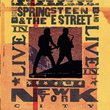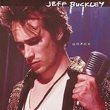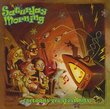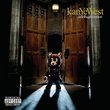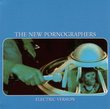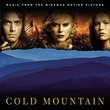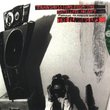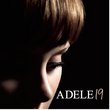| All Artists: Various Artists, Jon Brion Title: Eternal Sunshine of the Spotless Mind Members Wishing: 2 Total Copies: 0 Label: Hollywood Records Original Release Date: 3/19/2004 Re-Release Date: 3/16/2004 Album Type: Soundtrack Genres: Alternative Rock, Pop, Soundtracks Style: Indie & Lo-Fi Number of Discs: 1 SwapaCD Credits: 1 UPCs: 720616244925, 094635797725, 094635797756, 5050467275126 |
Search - Various Artists, Jon Brion :: Eternal Sunshine of the Spotless Mind
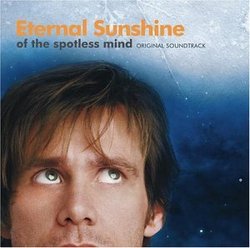 | Various Artists, Jon Brion Eternal Sunshine of the Spotless Mind Genres: Alternative Rock, Pop, Soundtracks
With his soundtrack for Eternal Sunshine of the Spotless Mind, Jon Brion has carefully crafted music every bit as quirky (and fascinating) as the movie itself. As he did with Magnolia and Punch Drunk Love, Brion has made a... more » |
Larger Image |
CD DetailsSynopsis
Amazon.com With his soundtrack for Eternal Sunshine of the Spotless Mind, Jon Brion has carefully crafted music every bit as quirky (and fascinating) as the movie itself. As he did with Magnolia and Punch Drunk Love, Brion has made a varied score filled with odd instrumentation, infectious melodies, and at least one or two near-perfect pop songs. Best of all, these offbeat tracks compliment the movie incredibly well, and stand on their own as great listening. Mood-wise, this soundtrack is all over the map: "Row" is a simple, haunting piano solo; the movie's opening theme sounds like the austere and melancholic notes of an antique music box; while the strings on "Drive In" are playful and inquisitive. Even the non-instrumental tracks are gems: Beck's "Everybody's Gotta Learn Sometime" and Brion's "Strings That Tie You" rank among these artists' best songs. A handful of well-chosen tracks from E.L.O., the Polyphonic Spree, and the Willowz rounds out this thought provoking disc. A gem. --Jason Verlinde Similarly Requested CDs
|
CD ReviewsBrion's Bach? Robert Rabiee | New York, NY United States | 03/17/2004 (4 out of 5 stars) "Multi-instrumentalist/producer/composer/wunderkind Jon Brion represents for Beatles-inspired pop once again with his sublime work on the soundtrack to Michel Gondry's new picture, "Eternal Sunshine of the Spotless Mind." Much like his soundtrack to "Punch-Drunk Love," Brion evidences a masterful knowledge of the pop idiom, everything from early-80s power-pop (Beck's Brion-crafted cover of Korgis's "Everybody's Gotta Learn Sometime") to neo-classical string exercises (especially the sublime "Main Titles"). A special treat is his own song, "Strings That Tie To You," which has been circulating on bootlegs for a few years now. The tune, a gentle heartbreak that wouldn't be out of place on one of Elton John's very early records, is as perfect a piece of pop as has been written in the last year. Soundtrack is hindered only by the inclusion of tracks by The Willowz, whose sound detracts from the dream-like quality of the rest of the record. All in all a brilliant outing for Brion & Co., able to stands on its own legs or as a souvenir of the picture." One of the best Kaufman soundtracks to date E. J. Sawdey | Galesburg, IL United States | 03/16/2004 (4 out of 5 stars) "Charlie Kaufman's movies have been brilliant, twisting, beautiful pieces of work. Some complain, but the average intelligent individual knows that, though flawed, each is one of the most original pieces of work you'll see in the given year. And fortunately, the soundtracks tend to match the film's with a wonderous grace and beauty."Being John Malkovich" featured Carter Burwell's saddest score to date, two mixes of a brand-new Bjork song, and the irresitable "Malkovich Masterpiece". Lesser-known (and Gondy-directed) "Human Nature" had an eclectic mix of jazz, pop, classical, and musical numbers ("Hair Everywhere"), and was a wonderful piece of work. The "Adaptation" score (also Burwell) was very understated and calm, featuring a bad Fatboy Slim mix and an excellent 60's classic ("Happy Together") which fit the film perfectly. And finally, the excellent pop-through-the-decades compilation that was the "Confessions of a Dangerous Mind" soundtrack beat all, featuring everything from Donovan & Freddy "Boom Boom" Cannon to Alex Wurman's score and a techno-remix by little-known dance act Peas.So, along comes the most star-filled film to date, with one of his best scripts, handled by the brilliant Michel Gondry. Yet, instead of going with Carter Burwell, Greame Revell, or Wurman, Gondry picked one of the best and underrated in the business - Jon Brion, the man who handled the scores for all of P.T. Anderson's films (including his brilliant work for "Punch-Drunk Love"). He's also produced countless artists (Fiona Apple chief among them) and has done his own solo work (his excellent web-only "Meaningless"). So, this is the right man for the job, right?We can now gladly say - absolutely.First of all, this is Brion's briefest score. Many of the songs are less than a minute, but still have an aural beauty to them, and are very understated and subtle - much like Burwell's "Adaptation" score, but far more lush. This is all best exemplified by his closing number, "Elephant Parade" - a touching and moving piece by itself. He also contributes another original song of his own, "Strings That Tie to You", which, though wonderful, simply doesn't top his own "Here We Go" from the "Punch-Drunk" score.Yet, he still manages to round up an elite and wonderful batch of songs. Chief among them isn't even in the movie (just in the trailer) - the joyous "Mr. Blue Sky" by E.L.O. One of the best Beatles knock-offs of all time (and I mean that in the best of ways). The use of Polyphonic Spree, and admittedly cheesy band, is good, particularly with the studio (and not orchestral) version of "Light & Day", though the KCRW version of "It's the Sun" borders on excess. The Don Nelson and Lata Mangeshkar tracks invoke true nostalgia, while unheard-of Willowz contribute a by-the-numbers rocker ("Something"), and a beautiful acoustic work ("I Wonder"), while a brand new cover by Beck brings his best Sea Change work to the table and creates the album's true highlight.While it isn't perfect, this is one of the best, high-end, beautiful, and diverse efforts ever done for a Kaufman film. And yes, one can enjoy it even if they haven't seen the movie." The Way It Should Be canticles | San Francisco, CA USA | 05/11/2005 (5 out of 5 stars) "I understand the criticism about how the pieces on this soundtrack sound underdeveloped. After all, we have tracks here that last only seconds long--"Postcard" is only twenty-two seconds long. It is difficult to listen to individual tracks alone and feel satisfied, unless you listen to the few swing and rock numbers interspersed throughout. But if you listen to the way this soundtrack is arranged in its entirety, you have to at least ask if the producer of the soundtrack didn't arrange so intentionally.
Some of these pieces enter abruptly, without a gradual introduction or fading in, such as "Phone Call." And some of these pieces, such as "Row," exit abruptly, as though you were in the middle of listening to it on your CD player and someone accidentally tripped over the cord and knocked the player out of commission. It doesn't take a genius to figure out that if the producers wanted to that they could have made smoother transitions between the tracks, by either sustaining the ending or fading in the beginning. This soundtrack, as far as I can understand it, exists as a whole, and can be appreciated best if listened to as such. It complements the movie very well. The abruptness of the pieces, the seemingly fragmented ideas, the strange mixes of swing, rock, Indian, and jazz genres all reflect the flitting in and out of ideas that go through the head as we sometimes search to remember things. The ideas come in fragments, in different colors and sizes; we remember things from different times, putting them together in wrong order, etc.; much like how Joel Barish was doing in the movie when he was trying to save his memory. I wouldn't be as satisfied with this soundtrack if it were done in the traditional sense of putting together a fully developed suite. Don't get me wrong. I'm not saying that I wouldn't be satisified if the pieces here were fully developed. Heck, I wouldn't have even thought of the idea of arranging the music the way it is here had this soundtrack existed in the traditional manner. But after having heard this arrangement, I would be less satisfied otherwise. And, as though to clue us in on their intentions, the producers bring us the tracks in a different order than their occurences in the movie (just as how the movie moved along not in a timely order), including giving us songs that were not in the movie. There's a song here called "Strings that Tie to You," which occurs in the middle of the soundtrack. I don't ever remember it being played prominently in the movie. But here, it is a key song, because its lyrics are the most relevant of all to the movie. The lyrics describe exactly how one would feel before going through with the erasing procedure described by the movie. The ending number on this soundtrack is "Elephant Parade." "Elephant Parade" lasts twenty-six seconds, and in the actual movie, it doesn't come even close to being near the end. But here, they put it last . . . because the tune it plays echoes the song "Strings that Tie to You." It takes you right back into the middle of the arrangement of this soundtrack. It echoes as memories do. It echoes in a manner reconstructed; not quite accurately. The last note is even withheld, to give us a sense of incompletion. But it echoes nonetheless. I don't think anyone can doubt that the placement of at least those two tracks is intentional. "Elephant Parade" may sound like a short, incomplete fragment. It may not be the most satisfying possible track to end the soundtrack. But placed at the end the way it is, I wouldn't have it any other way." |

 Track Listings (26) - Disc #1
Track Listings (26) - Disc #1